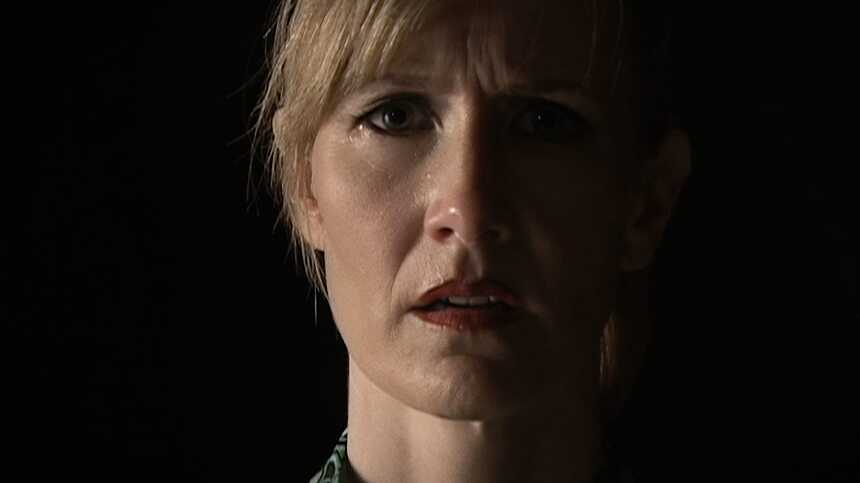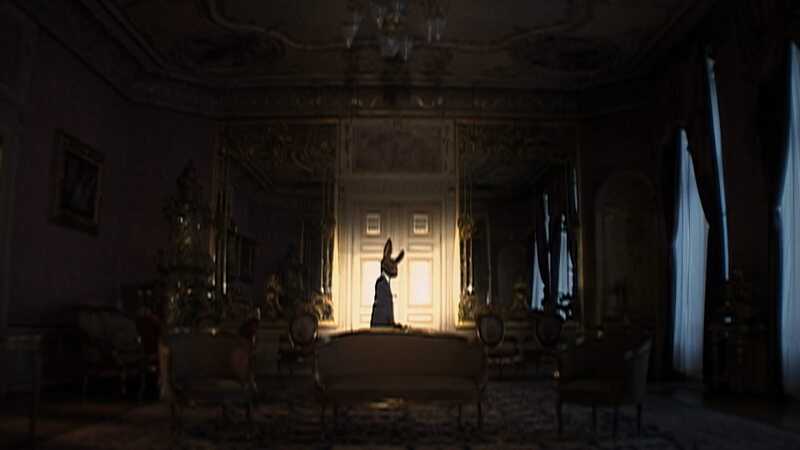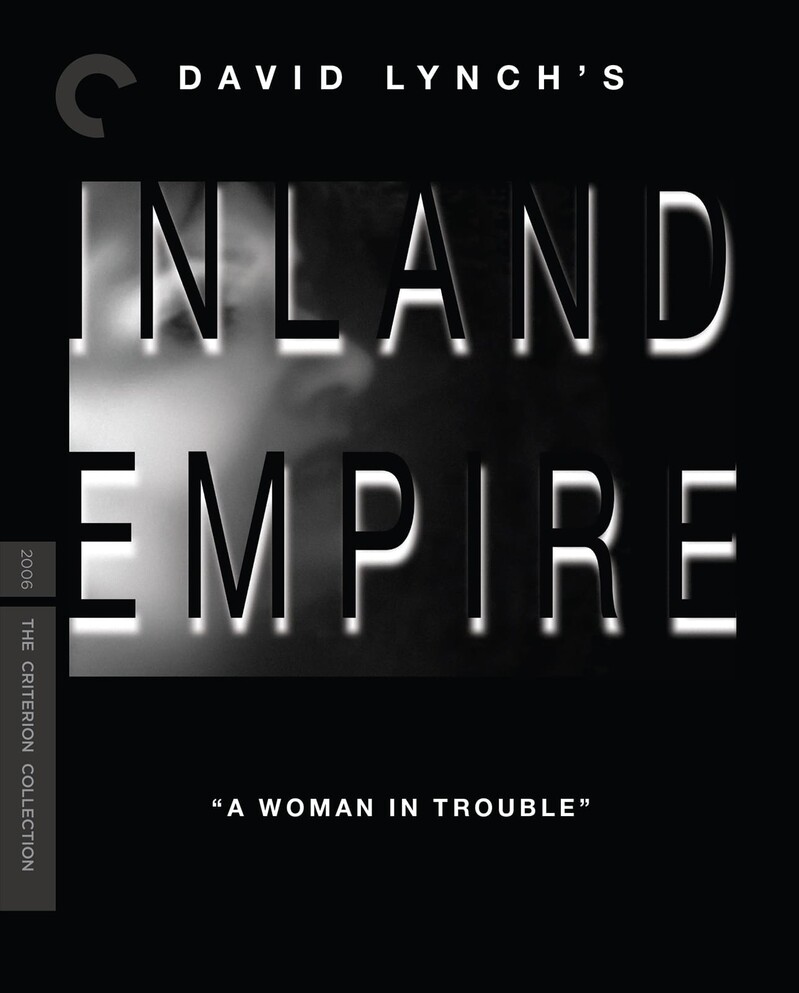Blu-ray Review: INLAND EMPIRE, Lynch's Abstract Masterpiece Comes to Criterion

I have to keep reminding myself that Inland Empire is, in fact, Lynch's most recent feature film. Since 2006, Lynch has directed music videos short films, and of course another season of his ground-breaking television series Twin Peaks. But no features since his 3-hour-long epic story of "A Woman in Trouble".
I might be the rare person for whom Inland Empire is their favourite of Lynch's work. I'm sure I'm also not the first person to wonder why it's been so long since we've had a film from Lynch. Maybe he just hasn't felt inspired with a story that would fit the format. Perhaps, like many directors of his generation, he's unable to find the funding (Lynch's films have usually been made without much assistance from the big Hollywood studios). We know he's had his creative attention in other areas. So it seems fitting that we're finally getting a Criterion release of this work, along with possibly the biggest bunch of extras that one could find on a Criterion disc.
Part romance, part thriller, but all strange and non-linear and experimental (in creation if not in final form), Inland Empire seems on the surface to be about a celebrated actress, Nikki Grace (Laura Dern), taking a role in a new film alongside notorious lothario Devon Berk (Justin Theroux). Their on-screen romance seems to suddenly be imitated in real life, as they fall into an affair that would leave them in danger of violence from Nikki's husband. But Nikki seems to be slipping between her real life and her character's Susan Blue, constantly confusing when the camera is rolling and when it isn't. A parallel story of a young woman in Poland being manipulated by an older man adds to the confusion.
But is the confusion just Nikki's, or is it also ours? Lynch wrote and filmed Inland Empire over almost three years, each scene connected to the next not always by times, not always by narrative, and not always by the cirumstances normally found on a film set. A fractured production perhaps means a fractured narrative, if there is one at all. Lynch has always worked outside the common boxes of what we consider narrative; and others has followed his example in how they make a film, though as often as not due to lack of funds (which was also the case with Lynch).
The light that comes from the side of the screen that introduces the film's title: it's the light of a film projector (oddly considering this was shot on digital), but it could also be a spotlight, a light from a doctor's instrument to penetrate and peer into the body; the flashlight of a police officer harassing an innocent person. The light demands attention; the light also determines how the person under its scrutiny will behave, or expose themselves.
As Nikki wends her way through this world of cold Polish winters, apartments with giant bunnies, a rogueish lover, a violently jealous husband, and the only solace a group of women who put on their own performance in answer to Nikki's need for comfort, she seems to become as fractured as the story. But Lynch has never provided stories that are neat and tidy; he gives us tales as our minds conceive them in our most terrifiying and terrified moments, our most vulnerable and often depraved moments. He asks that we not try and solve it like a mystery or seek satisfaction; merely that we experience it.
For a long time, Lynch was opposed to special features on DVDs, and fans would constantly request them - because who doesn't want more insight into Lynch's films? He then surprised fans with the first two-disc release of INLAND EMPIRE, loading it up with extras that were longer than the already long film. Some of those extras are on the Criterion disc, some are not. So if you have that first release, you might want to hold onto it, and add the Criterion for the new extras and the restoration.
Given that the film was originally shot in SD on a DV tape, the restoration process is not what we're usually used to (when it's from print film to blu ray). As such, the description of the process, as given in the release booklet, is both technical and oddly poetic. There's also a helpful (and dare I say cute) diagram to accompany the restoration process description. It looks as good, and as intended, from when I first saw it on the big screen - as a digital film.
The documentaries Lynch (One) and Lynch (2) are definitely a highlight of the film. Considering the history of the making of Inland Empire - over several years of shooting on random days and weeks, writing as he went, making us of locations both familiar to him (his beloved Los Angeles) and the not-so-familiar Poland (in the dead of winter, no less). The first documentary charts the making of the film with behind the scenes footage. We see Lynch, his cast, his crew, all working together for this something of an experimental collage. They have to deal not only with the film as a work of art, but the logistics. As such, it's not just an insight into how Lynch works (mostly nice but firm, sometimes maybe a little harsh, but you can see how he generally treats people fairly), but what goes into making a film with this kind of structure, under very unusual conditions. He gives his thoughts on the Middle American he grew up in, how his art and photography background have fed his filmmaking, how he met his current wife, and the lack of financial support. Yes, even a filmmaker as lauded as Lynch has to beg for money. Lynch (2) is (or so it seems) the outtakes from the first film, which shows a bit more of how he works with actors like Diane Ladd and Harry Dean Stanton.
It might be worth, before watching the above, to watch an interview between Kyle McLachlan and Laura Dern, filmed especially for the Criterion release. Obviously with the two actors, who have worked together and with Lynch numerous time, there is a friendship and camaraderie, and the way they speak about Lynch and his directing method. Dern talks about the acting process, and how working on Inland Empire, with a style even more experimental than Lynch often explores, along with the random shooting schedule, how it feels to play radical characters, and how Lynch makes you feel fearless as an actor.
Lynch's surreal semi-nightmare short Ballerina is included - definitely an image that will worm its way into your brain and find its way to your nighttime wanderings, even if you don't remember where it came from. Another interesting inclusion is excerpts from Room to Dream, Lynch's 2018 biography/memoir. He's such a great speaker with his very distinct voice and accent, and the exceprt veers widely from his love of photoshop to the story of how he met his current wife.
As with the previous release, More Things That Happened, deleted scenes from the theatrical release, are included. On one hand, it makes sense that not everything could be in the already epic length. But some of these scenes could be short films. Especially Dern's scenes as Susan Blue, giving a long monologue to an unknown person, with a bruise on her face and determination in her quiet yet strong voice. There's also a scene from the drug addict-prostitutes on the Los Angeles streets that we meet near the end of the film, and their conversation feels like a moment trapped in the amber of time, this time from this particular city.
In place of an essay, there is an excerpt from from Richard A. Barney's edited collection of interviews with Lynch. This particular interview, done by Barney, highlights Inland Empire. Among other of Lynch's thoughts on the film - such as it not being experimental but rather an abstract, non-linear film, the process of development, how the documentaries were done - Lynch also discusses his love of transcendental meditation and how it had an influence on this film is particular, and his writing process in general. Again, it might be worth reading it before watching the film, to then catch the influences.
Inland Empire Criterion Blu-ray will be released on March 21st.
Inland Empire
Director(s)
- David Lynch
Writer(s)
- David Lynch
Cast
- Karolina Gruszka
- Krzysztof Majchrzak
- Grace Zabriskie









